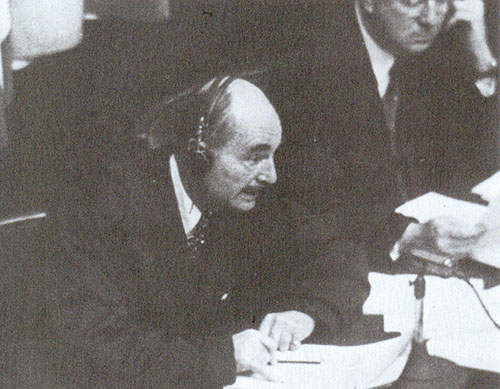- Published: 01 February 2013
- Hits: 3844
Judge Robinson on Judge Biddle
Delving Deeper into Biddle’s Impact …on America, on the World
by Jim Reiter
Jim Robinson is a retired federal administrative judge who is spending a lot of time lately looking into the life of another judge, Francis Biddle. Biddle is the subject of The Colonial Players’ new production, Trying, about the man whose accomplishments include personal secretary to Chief Justice Oliver Wendell Holmes, Attorney General of the U.S. under Roosevelt, and chief American judge at the Nuremberg trials under Truman.
 Robinson’s research, along with that of fellow volunteer Kurt Dornheim, is preparation for two forums The Colonial Players will hold during the play’s run. One forum will highlight the work of Trying’s design team. They will discuss the challenges met and the mysteries solved in bringing Biddle, Sarah, the time period and the place to life on our stage. Another forum will feature guest speakers who will focus on Judge Biddle’s role as principal American judge at the Nuremberg trials, along with a topic that haunted Biddle the rest of his life: the internment of Japanese-Americans during World War II.
Robinson’s research, along with that of fellow volunteer Kurt Dornheim, is preparation for two forums The Colonial Players will hold during the play’s run. One forum will highlight the work of Trying’s design team. They will discuss the challenges met and the mysteries solved in bringing Biddle, Sarah, the time period and the place to life on our stage. Another forum will feature guest speakers who will focus on Judge Biddle’s role as principal American judge at the Nuremberg trials, along with a topic that haunted Biddle the rest of his life: the internment of Japanese-Americans during World War II.
“He [Judge Biddle] was especially conflicted about the competing objectives of protecting the country in wartime and safeguarding the civil liberties of all its citizens,” says Robinson, who was an administrative judge with the Department of Veterans’ Affairs: “A judge’s first job is to make a decision, but only after having determined that it has a sound legal basis. In this case, former judge Biddle was opposed to the internment, both on legal and Constitutional bases. He saw it as against everything America stood for. After arguing against internment, he ultimately deferred to the president’s wartime authority and satisfied himself with removing his office of Attorney General from responsibility for administering the relocation of these American citizens. He regretted not doing more for the rest of his life, something that is mentioned in the play itself.”
For Robinson and Dornheim, doing the sort of research needed to put together the forums and also to pepper Trying’s playbill and lobby with a true sense of Biddle, is not so much a task as an unearthing of a treasure trove of material on an American patriot.
“He was an interesting guy, to say the least,” says Dornheim, who has directed several plays at Colonial and elsewhere. “When you do a play that is about a real person like this, and who had such an impact on the world, it’s fascinating to uncover all the things he did in his professional life that helped shape who he was as we see him in the play, during the final year of his life.”
Adds Robinson: “I love doing this type of research, especially because he and I have a bit of a connection, though it’s a loose one. But I have no talent for the stage, I don’t sing or dance or act, so being able to help bring the cast and crew, and ultimately the audiences of the show and those who attend the forums closer to Biddle as a truly accomplished American, is the way I contribute.”

